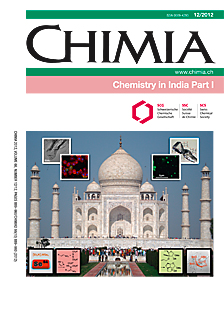4(R/S)-Amino/Guanidino-substituted Proline Peptides: Design, Synthesis and DNA Transfection Properties
DOI:
https://doi.org/10.2533/chimia.2012.936Keywords:
4-aminoproline peptides, Cationic collagen mimetics, Cell penetrating peptides, 4-guanidino proline peptidesAbstract
Collagen is a major structural protein found in the connective tissues of higher organisms and mammals and its biomechanical properties are related to the high thermal stability of its triple helical structure. The primary structure of collagen is composed of the repeating tripeptide motif of Pro-Hyp-Gly, where Hyp is 4 R -hydroxy proline. Cationic collagen mimetics consisting of [Pro(X)-Pro(Y)-Gly]6 where Pro(X) and Pro(Y) are 4(R/S)-amino/guanidine proline have been synthesized and shown to form triplexes more stable than the unmodified collagen peptide [Pro-Hyp-Gly]6. The origin of hyperstability is due to conformational pre-organization of proline pucker arising from the electronegativity of the cationic group. These cationic collagen peptides are shown to be effective cell penetrating and plasmid DNA transfecting agents. The results have potential for design of new collagen mimetics for biomaterial applications and efficient cell penetrating agents for drug delivery applications.Downloads
Published
2012-12-19
Issue
Section
Scientific Articles
License
Copyright (c) 2012 Swiss Chemical Society

This work is licensed under a Creative Commons Attribution-NonCommercial 4.0 International License.
How to Cite
[1]
Chimia 2012, 66, 936, DOI: 10.2533/chimia.2012.936.







